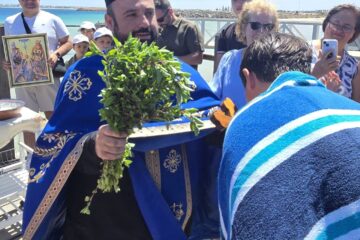The following in an excerpt from “Eros of Orthodoxy,” translated by Fr. Nicholas Palis and written by Mr. Pantelis Paschou.
Homer’s “Odyssey” relates the adventures of Odysseus and his companions when they returned from the Trojan war to their homeland Ithaca. There is also a second “odyssey,” a Christian one written by the grace of God. This one is found like a precious scroll in God’s “vessel of choice”: the Apostle Paul. It relates not only the uncanny return of the great persecutor to his divine Ithaca but also his spiritual adventures and struggles. His return from destroyed Troy (the world of the war of passions and of disbelief) to the calm land of the Christian’s Ithaca is none other than the Kingdom of the Heaven.
When Paul started his mission, Christianity was comprised of a small and insignificant number of Christians, amongst the fanatic Jews. When 30 years later the Apostle left this earth, leaving for his beloved heavenly trip, Christianity had become a worldwide religion. This was not an ideal time. Let’s remember what he wrote to the Corinthians about “the tortures” which he bore in his travels through the world preaching the Gospel: “with far greater labors, imprisonment, and countless near death beatings. Five times I received forty lashes less one at the hands of the Jews. Three times I was beaten with rods; once I was stoned. Three times I was shipwrecked; a night and a day I was adrift at sea. On many journeys I was in danger from rivers, robbers, my own people, from Gentiles, danger in the city, wilderness, at sea, from false brethren in toil and hardship, through many a sleepless night, in hunger and thirst, often without food, in cold and exposure.” (II Cor. II 23-27). He became as sacred Chrysostom says “the teacher of the universe, who ran about like a bird, the vessel of choice, the bridegroom of Christ, the sower of the Church, the wise architect, preacher, runner, struggler, soldier, and teacher of children who in every part of the universe leaves reminders of his own virtue”.
In speaking about the Apostle Paul one must briefly refer to the miracle of Damascus in order that we might work toward a personal, salvific and enlightening Damascus of our own. Let no one ask that since man’s soul is “by nature Christian” why is the road to Damascus necessary for our return to Christ? We must not forget that satan doesn’t cease fighting us, pulling us away from the path, making us enemies and persecutors of Christ and his law. For this reason it is necessary to remember and seek the light of Damascus, which will sustain us with a divine joy and ecstasy, first through the Gospel and then in union with God. So that we may also one day say along with the Apostle Paul: “for me to live is Christ” (Gal. 2:20) or “I no longer live, for it is Christ who lives in me” (Gal. 2:20). These are the most perfect forms of Christianized mysticism of Orthodoxy and one of the highest and holiest ideals that the Christian must have.
Saul, or Saoul was born in Tarsus of Celicia, of very wealthy Jewish parents, who had acquired the title of Roman citizens. He developed his rich spiritual gifts, learning all the Law and the Prophets at the feet of the famous Rabbi Gamaliel. Out of excessive zeal towards the religion of his fathers, he hated the Christians and wanted to annihilate them. Because he was very young, he was not allowed to take part in the dreadful stoning of the first martyr Stephen, but he guarded the garments of those stoned. Full of hate and rage against Christians, he asked for letters of recommendation to the synagogues of Damascus from the Jewish high priest, where he would go to capture as many Christians as he could find and bring them bound to Jerusalem.
While he was walking, he approached Damascus, and suddenly a light from heaven flashed about him, and falling to the ground he heard a voice saying: “Saul, Saul why do you persecute me?” Astonished Paul asked, “Who are you, Lord?” The Lord said. “I am Jesus whom you persecute. But arise and enter the city and you will be told what to do” (Acts 9:3-6).
Supported by his companions, who heard the voice but didn’t see the flashing light which flooded the Apostle, Paul rose and went to Damascus, where he remained for three days without seeing anything and without eating any bread or water. From this point forward, the new life of the great persecutor of Christianity began. He became a vessel of divine grace, “a chosen vessel,” and the greatest teacher of the Gospel of the New Testament.
I don’t want to focus on negative criticism, wherein some refer to the illumination of Paul by the uncreated light as a feverish crisis from a sickness of the eyes or a sunstroke. Febrile crises and sunstrokes require hospitalization and don’t give one wings to preach about the life and salvation in Christ. Prior to Damascus, Paul waged monstrous acts against the Christians. After the vision, from Saul (meaning headaches, for the Christians) he became Paul (meaning respite, rest for the faithful). Saint Peter Damascene, commenting on his change of name, remembers the words of sacred Chrysostom: “for as much as he formerly shook the faithful, afterwards he gave rest to the souls of all, by word and deed.”
Saint Makarius responds to the blessed Paul: “The light which illuminated the road, through which he was lifted up to the third heaven, enabled him to hear unspeakable mysteries. It was not an enlightenment of thoughts and knowledge, but the power of the good spirit hypostatically illuminating the soul whose excessive brilliance the eyes of the flesh could not bear without being blinded, through which all knowledge is revealed, and God truly is made known to the worthy and loving soul.” This is the wisdom of the saints, which the worldly “foolish” wisdom mistakes and mentally interprets as supernatural events, such as the vision of Damascus and the mystical return of the Apostle Paul.
In conclusion, we would like to point out something which Christians today seldom notice. The Apostle Paul mentions it to the Galatians: “But when he who had set me apart before I was born and had called me through his grace was pleased to reveal his Son to me in order that I might preach him among the Gentiles, I did not confer with flesh and blood nor did I go up to Jerusalem to those who were apostles before me but I went away into Arabia and again I returned to Damascus. Then after three years I went up to Jerusalem…” (Gal. 1. 15-18). “I went away into Arabia” i.e. in the desert, where man finds himself and can hear the voice of God without disturbance, and where the presence of God is like “a light breeze.” The Gospel reveals in the Prophets and Apostles that “I went away into Arabia” shows a difficult road which leads to the high but rough majesty of holiness. Before we expose ourselves to the great trip of life–whether we are simple faithful or theologians, clergymen, teachers, priest-preachers–we must pass through the furnace of a desert like the far and waterless desert of Arabia. We must pass through some strict ascetical monastery, from some Holy Mountain, where we can live the sanctified solitude of the great Saints, through which the apostle Paul also passed, in order to reach the point of saying: “It is no longer I who live, but Christ who lives in me.”



0 Comments